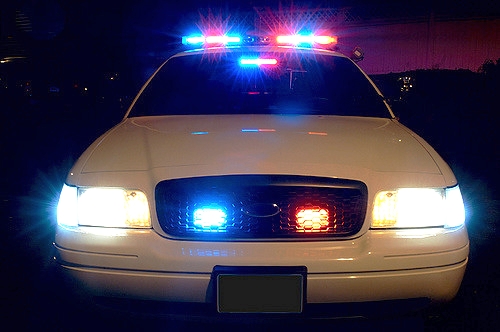When flashes of red and blue appear in the rear view mirror and the piercing sound of a siren soon follows, many drivers begin to panic as they realize they are being pulled over by the police. Drivers start thinking back on all of the bad things they ever done while behind the wheel of the car - that time when they were speeding to make it to work on time, another time when they didn't use a turn signal when changing lanes, or all those times they were texting while driving. Rather than freaking out, motorists should keep a level head, and remember the following information on how to handle a police stop.
Michigan State Police Lieutenant Rob Davis recently spoke with an MLive reporter in order to supply the public with, what he calls, proper traffic stop etiquette. Lt. Davis warns that his advice is not to be taken as a "how-to-guide" for traffic stops, since no two traffic stops are the same. Nonetheless he has supplied the public with a general rule of thumb of what to do when being pulled over.
What To Do When Pulled Over By Police
1. Acknowledge That You Are Being Pulled Over
Drivers can do this by simply turning on their turn signal to alert not only the officer that they intend to pull over to the side, but other drivers as well. “I can’t speak for everyone else but this simple gesture always held a lot of weight in my decision making,” Lt. Davis said.
2. Get To A Safe Location
What Lt. Davis means by finding a safe spot is that the driver should find an area on the roadway where they can be easily seen by passersby. Make sure the area is well lit not just for the safety of the driver but for the officer as well. That means avoiding sharp curves or bends, dark intersections, deserted roads, etc.
3. Roll Down Your Windows
Once a safe area is found and the motorist has put their car in park, Lt. Davis states that rolling down both side windows, especially if they are tinted, and if need be, turning on the interior lights of the car, is a good idea. "It makes it easier for both parties to see." Lt. Davis said.
4. Police Are Naturally Cautious, Don't Be Offended
This advice goes to those motorists who instantly respond with hostility or offense at the officer's cautious approach. The officer who signaled for you to pull over is trained to be vigilant and to be prepared for anything. It's nothing personal. Just as the motorist may not know the officer, the officer doesn't know the driver or how they may react.
5. "Identification and Proof Of Insurance, Please"
First, Lt. Davis warns that if a driver must go digging for their documentation, they should wait until the officer signals them to do so. Secondly, drivers should refrain from removing their seat belt unless the officer wants them to step out of the vehicle.
6. "Did You Know You Were Doing 10 Over The Speed Limit?"
This is the point in the traffic stop that many drivers hate, because depending on their response they will either be walking away with a citation or a simple warning and a promise to the officer to never do it again. Lt. Davis said, “Hopefully the officer will advise you whether you're receiving a ticket or not prior to returning to his car."
7. You Are Free To Go
The end of a traffic stop is once again decided by the officer. Drivers should have their documentation returned back to them, a ticket, or not, and a verbal confirmation given by the police deputy.
8. Safely Merge Back Into Traffic
Once again, drivers shouldn't be offended by the officer remaining behind them with their lights on. More than likely the officer wants to make sure that the driver is safely back in traffic or is finishing up paperwork or even answering another call.
Whether a driver agrees with the ticket or not, they should accept the officer's judgement and wait to argue the ticket in a hearing rather than confronting the issuing officer. Try to keep from making the situation worse by physically or verbally showing anger. The officer is simply doing their job by making sure the roads are safe for everyone.
These tips are just that, tips. They are not rules to follow and do not guarantee that you won't get a ticket. Instead, these are polite pieces of advice to follow to ensure that a traffic stop goes over smoothly and respectfully on both the officer and the driver's end.
Traffic stops are not enjoyable and can be quite nerve wrecking, but hopefully Lt. Davis' advice will help relieve the pressure in how to properly conduct one's self in case a traffic stop happens. Is there a traffic ticket you want to argue in court? Call The Michigan Law Firm, PLLC today for a free consultation at 844.4MI.FIRM.


